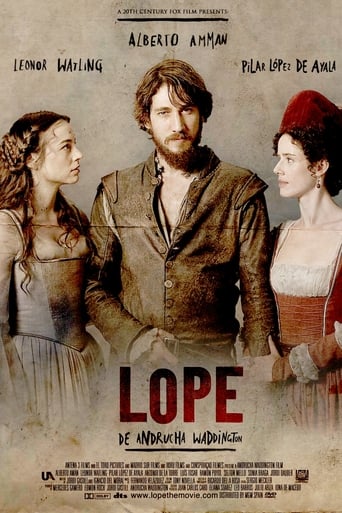

it is more than a Spanish version of Shakespeare in love. it is more than portrait of a great play writer. or a homage. it is an admirable work about the spirit of a period, the life of a hero in different sense, a great expression of force for the Spanish cinematography. adventure, love stories, conflict with law, the strong taste of life, the light behind the shadows and a great cast. Lope is that kind of film who use the costumes, landscapes, small personal stories , fragments of biography for create a total show, impressive not only for the force of image , but for its extraordinary message. that does its magical seduction. to propose a credible story about a literary myth. and this Lope de Vega who has for his image the work as seed.
... View Morenot special.but not exactly common.a kind of Spanish Shakespeare in love but with personal note. because it is, in some measure, a propaganda work. to remember figure of a great poet and playwright from Baroque period, a fresh delicate love story, a Romantic and, in same time, nice story it is an admirable idea. and the nuances of gray and green, the slices of theater play, the costumes, the buildings, the sky and sea, the air of fairy tale, all as parts of a precise portrait are good gifts for each viewer. it is not extraordinary. but, indeed, it is beautiful. and the short meeting with Sofia Braga or the correct performance of Alberto Ammann are not bad prizes for viewer.
... View MoreThis interesting film concerns on Lope De Vega who was one of the key figures in the Spanish Golden Century Baroque literature. His reputation in the world of Spanish literature is second only to that of Cervantes, while the sheer volume of his literary output is unequalled, making him one of the most prolific authors in the history of literature.During the Spanish Golden Age, Lope De Vega (Albert Ammann) is set to Madrid after a war in the Azores. Deceased his mother (Sonia Braga), decides to grow his passion for theater and poetry, while seeking the support of an entrepreneur. Meanwhile, cultivates a lovely relationship among two women ( Pilar Lopez De Ayala and Leonor Watling).The director, producer and screenwriter Brazilian Andrucha Waddington takes this big bet in Spanish cinema. After costumer blockbusters like''Alatriste'', the Spaniard cinematic industry is giving birth to a kind of ''Shakespeare in Love'' and it does in some special way. A lavish staging and some renowned actors are the packaging of this prestigious project. Headlining the Argentine Alberto Ammann, discovered in the remarkable ¨Cell 211¨ . Next to him, an all-star-Spanish-cast : Leonor Watling, Pilar Lopez De Ayala , Juan Diego , Miguel Angel Muñoz , and, interestingly, his sidekick prison 211 , Luis Tosar. ¨Lope¨did well at the box office, something not very common in Spanish cinema. The ¨Goya¨ prizes also welcomed with open arms, but its seven nominations could do little to the charm of ¨Pan Negro ¨ or ¨Black Bread¨. Best Costume and Song were the only categories awarded.This biopic deal with the life of Lope De Vega, the Spanish playwright who dominated Spain's early Golden Age of theater regarding his problematic life since his fight in Azores to his penalty of exile . The events are the following : In 1583 Lope enlisted in the army, and he saw action with the Spanish Navy in the Azores. Following this he returned to Madrid and began his career as a playwright in earnest. He also began a love affair with Elena Osorio (Pilar Lopez Ayala), an actress and the daughter of a leading theater owner. When, after some five years of this torrid affair, Elena spurned Lope in favor of another suitor, his vitriolic attacks on her and her family landed him in jail for libel and, ultimately, earned him the punishment of eight years' banishment from the court and two years banishment from Castile. He went into exile undaunted, in the company of Isabel De Urbina (Leonor Watling), the daughter of a prominent adviser at the court of Philip II, whom he was subsequently forced to marry. A few weeks after their marriage, however, Lope signed up for another tour of duty with the Spanish navy: this was the summer of 1588, and the Invincible Armada was about to sail against England.Lope's luck again served him well, and his ship, the San Juan, was one of the few vessels to make it home to Spanish harbors in the aftermath of that failed expedition. Back in Spain, he settled in the city of Valencia to live out the remainder of exile and to recommence, as prolifically as ever, his career as a dramatist.In 1590 he was appointed to serve as the secretary to the Duke of Alba, which required him to relocate to Toledo.In 1595, following Isabel's death in childbirth, he left the Duke's service and returned to Madrid. There were other love affairs and other scandals: Antonia Trillo De Armenta, who earned him another lawsuit, and Micaela de Luján, an illiterate but beautiful actress, who inspired a rich series of sonnets and rewarded him with four children. In 1598 he married Juana De Guardo, the daughter of a wealthy butcher. Once that decade was over, however, his personal situation took a turn for the worse. His favorite son, Carlos Félix , died and, in 1612, Juana herself died in childbirth. Micaela also disappears from the history around this point. Deeply affected, Lope gathered his surviving children from both unions together under one roof.His writing in the early 1610s also assumed heavier religious influences and, in 1614, he joined the priesthood. The taking of holy orders did not, however, impede his romantic dalliances, although it is somewhat unclear what role his employer the duke, fearful of losing his secretary, played in this by supplying him with various female companions. The most notable and lasting of his relationships during this time was with Marta De Nevares, who would remain with him until her death in 1632.Further tragedies followed in 1635 with the loss of Lope, his son by Micaela and a worthy poet in his own right, in a shipwreck off the coast of Venezuela, and the abduction and subsequent abandonment of his beloved youngest daughter Antonia. Lope De Vega took to his bed and died of Scarlet fever, in Madrid, on 27 August of that year.
... View More